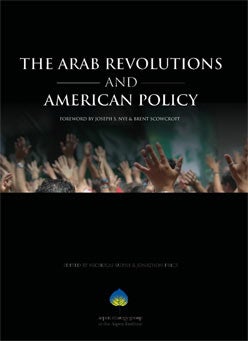 In December 2010, the self-immolation of a street vendor in Sidi Bouzid, Tunisia incited demonstrations and riots throughout Tunisia and catalyzed a wave of revolutions across the Arab world. In the two years that have passed since, authoritarian regimes have been overthrown in four countries—Tunisia, Egypt, Libya, and Yemen—and momentous civil uprisings have erupted in Bahrain and Syria. These revolutions have brought the most significant and historic change to the Middle East in a nearly a century.
In December 2010, the self-immolation of a street vendor in Sidi Bouzid, Tunisia incited demonstrations and riots throughout Tunisia and catalyzed a wave of revolutions across the Arab world. In the two years that have passed since, authoritarian regimes have been overthrown in four countries—Tunisia, Egypt, Libya, and Yemen—and momentous civil uprisings have erupted in Bahrain and Syria. These revolutions have brought the most significant and historic change to the Middle East in a nearly a century.
Trying to see far into the future has always been an integral element of American grand strategy, and so the United States must strive to understand these momentous changes—and how they will affect American policy in the region. However, policymakers are operating in a context of extreme uncertainty arising from regional instability, uneven transitions, and the rise of non-state actors increasingly aware of their individual and collective power. All this plays out in the shadows of a history of American experience that shows making big bets on long-term outcomes has largely ignored the fragmented nature of the Middle East.
To help policymakers and the public make sense of these dramatic changes, the Aspen Strategy Group has just released The Arab Revolutions and American Policy, featuring a compendium of essays on these powerful events by some of America’s most astute observers of Middle East politics and US foreign policy. They were presented in August 2012 at the annual meeting of the Aspen Strategy Group, a resolutely bipartisan organization of former secretaries of state and defense, national security advisors, ambassadors, professors, journalists, and businesspeople. Over the course of four days, the ASG examined and debated the future of American policy in the Middle East. The group put a special focus on key issues, such as the critical period of transition in Egypt; escalating violence and options of intervention in Syria; the threats associated with a nuclear Iran; the importance of formulating an effective strategy to deal with immediate economic assistance and long-term investment in the region; and the Obama administration’s successes and failures during the overall process of democratization.
The chapters in our new book individually and collectively also tackle the big questions. Has American leadership been wisely restrained? Or has the US lost influence as a result of being too reactive in its approach? How can the United States construct a regional approach while maximizing flexibility and course-correction in order to adjust to fragmented polities, conflicting identities, and competing interests? Does the US have a crucial role to play in shaping the trajectories of these countries during this critical period of transition?
Given America’s vital interests in the region, it has become clear there is a need to reflect carefully on the lessons from the events of the last two years. The members of the Aspen Strategy Group believe that the Arab revolutions have shown encouraging signs of a region determined to end a decades-long era of authoritarian rule, but the US must also remain focused on building a comprehensive and flexible strategic framework that will help us navigate the challenges and opportunities that lie ahead. With the breadth of the changes underway, the US has no choice but to consider major changes to its approach to the Middle East at a time when American influence is in question.
For further reflection, find The Arab Revolutions and American Policy here for purchase.

